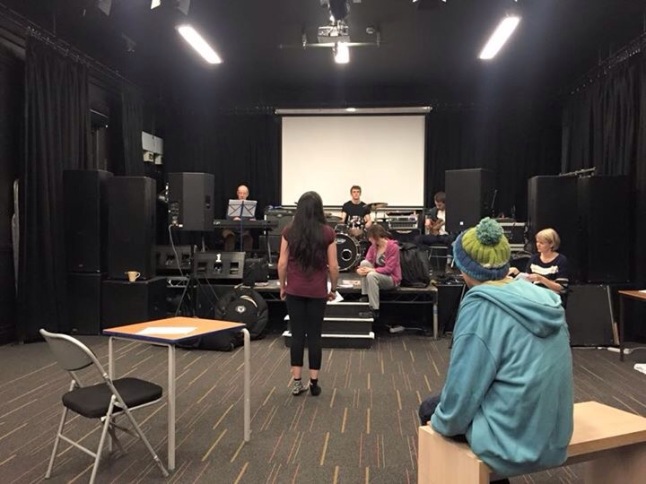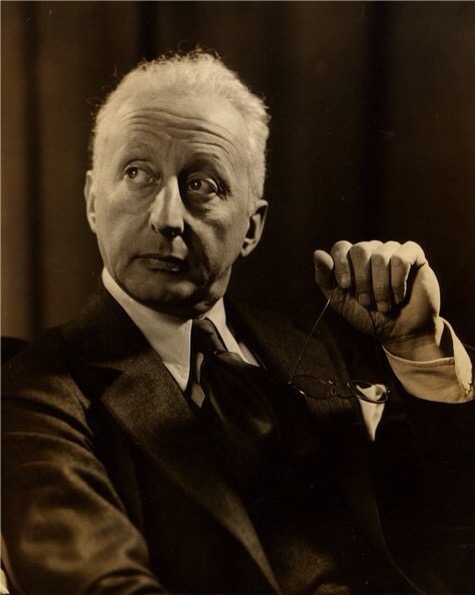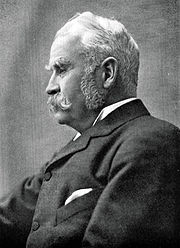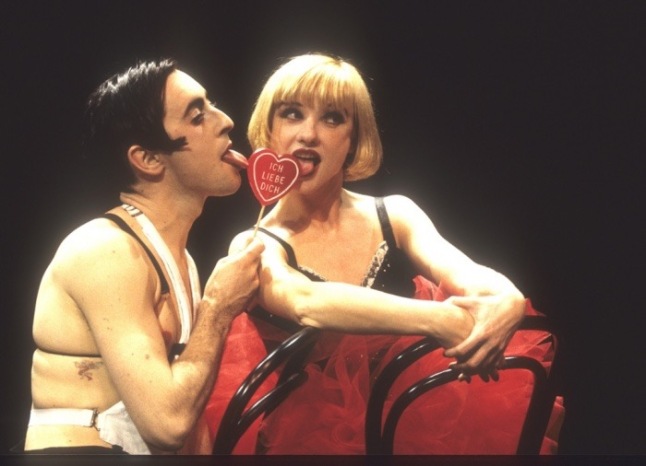In a 1957 “secret memorandum” from the Lord Chamberlain, who was responsible for theatre censorship, included a ban on jokes about homosexuality and embraces between men.
In the memo to his team of censors, he warned: “We would not pass a play that was violently pro-homosexual.”
“We would not allow ‘funny’ innuendo or jokes on the subject.”
“We will not allow embraces between males of practical demonstrations of love. We will allow the word ‘pansy’, but not the word ‘bugger’.”
He added no explanation about why pansy was deemed an acceptable term but bugger was not.This was lifted in 1957.
Month: February 2015
Thursday 12th February-Run through with band.
Today proved to be tedious however gave us a clear indication In to alterations in singing and dancing we have to make. For instance, Wilkommen had a longer dance break than we originally thought,therefore we have decided to make the most of it and include a comedy scene between me and Alisha who plays victor(ia). We have came up with a. Few ideas being short notice however we are confident by Monday afternoon he routine will be complete. We want this comedy scene to be very dramatic almost like we are seeking attention. Originally Alisha was doing this section of music on her own , so this means we can take ideas and develop them and create a new routine.
Surprisingly the majority of the dances worked with the music however it’s made us understand how we need to constantly increase he volume of some of the numbers because they aren’t making a big enough impact and In the box we won’t be heard over the band. This rehearsal helped me personally with when I am meant to be dancing and indicated me when to do a certain move etc. It helped simplify the choreography due to the clarity of the band.
By the next time we rehearse with the band, my own personal goal is to be able to confidently dance with the bands music and for the 8 bars to be choreographed for me and Alisha .
First singing rehearsal -On The Street Where You Live.
This rehearsal proved to be very productive. The first time I sang this song proved to be very difficult due to the amount of vowels In each verse such as “all that once am I” this meant the clarity on them verses had to be the highest. Also my breathing was very completely wrong. To make sure I breathed in all the correct places,I sang through the song and marked all the places in which I was out of breath so I could therefore mark out where I could possibly breathe so I could make sure my notes were strong. I found out I rush a quick breath before I sing so I used a different technique. I ended the note sooner so I could inhale a deeper breath through my nose. Using my diaphragm produced a clearer and stronger feel to the song.
Freddy Eynsford-Hill is immediately taken by Eliza’s charms and falls in love with her. Not able to put her out of his mind, he waits in front of Professer Higgins’ house to catch a glimpse of Eliza. As he waits he sings the enchanting song, On the Street Where You Live.
This song has to show the emotion without having the female on stage. Vocally I want it to emphasise the love with minimal action but simple movement walking around the stage almost in a trance or day dream about Eliza. Thinking about set I think that a lamp post would like nice in the centre of the stage and also could be used throughout the show such as the Shakespeare piece.
Jerome kern research.
Jerome David Kern was born in New York City. He studied piano with his mother and in high school was often asked to play piano and organ and compose music for school theatrical productions. In 1902, at the age of 17, he tried his hand at a business career working for his father, who owned a merchandizing house. But the young Kern’s enthusiasm for music led to his ordering 200 pianos from an Italian dealer instead of two—the number he was supposed to purchase. This action almost cost his father his business, and to Kern’s relief, it was agreed that he should pursue a career in music.
-One of 20th-century America’s greatest composers, known for writing “Ol’ Man River,” “The Way You Look Tonight,” and hundreds others.
-He also composed music for silent films, possibly beginning in 1912, but definitely in 1916 for “Gloria’s Romance,” a 20-part serial.
-Kern’s first complete score was Broadway’s The Red Petticoat (1912), one of the first musical-comedy’s .
-Kern composed sixteen Broadway scores between 1915 and 1920 and also contributed songs to the London hit Theodore & Co.
Musical Theatre- Back to the roots.
Where did Musical Theatre Begin?
Musical theatre originated in Ancient Greece.With their types of drama ,Comedy, tragedy and satyr.The dramatists Aeschylus and Sophocles composed their own music to accompany their plays and choreographed the dances of the chorus.
The stage in which Music in theatre actually evolved was during the rennaissance period (1300’s-1700’s) however unlike modernised musical theartre, there just happened t be a musical number at the end of each act.
An evolution of Musical theatre occured to produce the musical theatre we have today which tells a coherent story…
Opera
- Opera is the presentation of a story told through music…similar to modern musicals.
- The first opera was Daphne, first performed in 1598 during Carnival at the home of Jacopo Corsi (d.1604) in Florence
- Opera used dance to outline a story… ballet was a common dance to opera.
- Operas generally have no dialogue but the lyrics are sung to carry the story along.
- Most operas are sung all the way through. However, many operas include spoken portions: La Traviata, Carmen, and La Boheme
Operetta
- Operetta had a larger impact on western culture as this was more a common persons entertainment. Opera like today proved to be dense and only a sophisticated type of entertainment.
- Operetta is a genre of light opera, light in terms both of music and subject matter
Musicals, Operas and Operettas contribute to mankind’s quality of life. By providing beauty,inspiration and thought-provoking educational scenes to enrich viewers life experience.
Gilbert and Sullivan
- Gilbert was born in London on 18 November 1836. His father, William was a naval surgeon who later wrote novels and short stories, some of which included illustrations by his son. In 1861, to supplement his income, the younger Gilbert began writing illustrated stories, poems and articles of his own, many of which would later be mined as inspiration for his plays and operas, particularly Gilbert’s series of illustrated poems, the Bab Ballads.
- Sullivan was born in London on 13 May 1842. His father was a military bandmaster, and by the time Arthur had reached the age of 8, he was proficient with all the instruments in the band. In school he began to compose anthems and songs. In 1856, he received the first Mendelssohn Scholarship and studied at the Royal Academy of Music and then at Leipzig, where he also took up conducting
- The main aim for G&S was to echo their own struggles thrugh their shows to increase the popularistation (so the audience can relate to the themes)
https://www.youtube.com/watch?v=XREhtGxdb04&feature=player_embedded
Task 8-Job Adverts
Task 8- Job Adverts
http://castings.thestage.co.uk/
This is a link to a stage casting website. It gives you all the information about stage auditions which are paid and voluntary. To be a member of these sites you have to have a membership which is sometimes free however for full access usually requires a small membership fee of around £10+.The site asks for your height,weight,acting age, appearance and headshot. This job works like normal jobs in which you apply and the employer gets back to you with further details if successful. If successful you are then given an audition then if you are successful you get a call back and then either an offer for the job or not.
Another way of getting in to the performing arts industry is through an agency. Agencies tell you about all of the upcoming auditions locally and internationally. You can find an agent online. You do not have to pay for anything until you have been given a paid role. The agent only gets a percentage of your pay.
Task 7-How to Apply for a job.
Task 7- How to apply for a job.
In the modern day, there is a variety of ways in which you can apply for a job. Most commonly, websites such as Direct Gov Job which advertise local and international jobs giving the applicant essential information about the position, and how to contact the employer to convey interest.
When applying online, usually they give you a scenario and questions as a form of limiting the applicants to ensure they employ the best applicant. In addition to this a CV is also required to be attached to your application in many cases.
A more informal but personal interaction to your employer is going in to the business and speaking to the manager and handing in a CV. Even if a position is not available, it shows you still have interest in the business. This would be appropriate for small businesses such as a café or small hotel.
Another method of application is receiving an application package from your employer. This is a very methodical way to show yourself off before your interview and gives the employer all the information on a piece of paper.
Many shops prefer you to do a trial before you commence working at their establishment. Volunteering is a good way to appeal to your employer to show off
Cover Letter Draft
11 Hood Street
Barrow-In-Furness,
Cumbria,
LA14 1NR.
Mr Simon Keller,
Operations Manager,
Disney Cast Members,
Fitzroy Street 22a-26b,
London SW1.
10th February 2015.
Dear Mr Simon Keller,
I am writing to convey my interest in joining your team. I am currently studying the extended Diploma in Performing Arts at Kendal College. I have a variety of skills which includes being a confident experienced performer in amateur shows. I work well in a team and have communication skills with guests. I have an interest in developing my skills and joining your team and being a keen and enthusiastic m member of your cast.
I hope I have provided you with sufficient information to offer me an interview. I enclose a stamped addressed envelope.
Yours sincerely,
Cameron Luke Barlow
Final CV.
Cameron Luke Barlow – curriculum Vitae.
Personal statement
- I am a dedicated, organized and methodical individual. I have good interpersonal skills, am an excellent team worker and am keen and very willing to learn and develop new skills. I am reliable and dependable and enjoy being given responsibility. I have an active and dynamic approach to work and known for getting things done. I am determined and decisive. I identify and develop opportunities.
Key Skills
- Accomplished communication skills, both written and verbal, developed through numerous essays and presentations given during my time at school and college.
- Ability to take the initiative and work well under pressure, ensuring strict deadlines are met, as successfully demonstrated during work experience placement project and current employment.
- Flexibility, whilst maintaining enthusiasm and commitment to each job.
- Proficiency in all areas of Microsoft Office, including Access, Excel, Word and PowerPoint
- Ability to deal with problems tactfully and efficiently.
Education
College
Kendal college level 3 extended diploma in Performing Arts. (November 2014-june 2016)
School
8 GCSES at A-C including maths and English. I also have 2 BTECS including Performing Arts at D*
Employment
Abbey house Functions (e.g. weddings) bar work and Oscars Restaurant
- Preparing room for service.e.g. laying out cutlery and napkins(setting up for weddings etc.)
- Cleaning of public areas and toilets to a high standard.
- Cleaning of the bar and restaurant after service.
- Making sure cutlery and plates are polished to a high standard.
- Room services
- Setting up for service in the kitchen e.g. supplements
- appearance of room e.g. Cavendish, abbey hall
- Confident worker on the bar.(fully trained)
Work Experience
Barrhead Travel/Cruise Direct 2013
- Admin on computers on travel agency software and also Microsoft Programs
- Creating and deleting accounts
- Working alongside a large team in different departments
- Answering the phone to cruise companies and clients
References
John Horton (General Manager)
Abbey House Hotel & Gardens
Abbey Road,
Barrow-in-Furness
LA13 0PA
England
0844 8262091
johnhorton@abbeyhousehotel.com
Alan Eddevane (Functions and weddings Manager)
Abbey House Hotel & Gardens
Abbey Road,
Barrow-in-Furness
LA13 0PA
England
0844 8262091
Alan@abbeyhousehotel.com
Cameronlukebarlow@icloud.com
07763346160
11 Hood Street,
Barrow-in-Furness
Cumbria
LA14 1NR
Cabaret revival 1993.
Cabaret is a musical based on the Christopher Isherwood novella ‘Goodbye to Berlin’, and the Druten play ‘I am a Camera’. The show is set in a nightclub in 1930s Berlin just as the Nazi party begin to rise to power. Featuring music by John Kander and lyrics by Fred Ebb, the show has been revived countless times in both London and New York, but is perhaps most well known for the 1972 film adaptation which starred Liza Minelli. The show has gone through various re-writes, with new songs added for each new production. Numbers were written specifically for the film, and in many new productions these are now added to the musical. Many famous faces have played the lead roles over the years, from Dame Judi Dench to the late Natasha Richardson, Alan Cumming, Neil Patrick Harris and singer Will Young.
The 1993 revival included
Director…Sam Mendes
Choreography…Lea Anderson
TOP CAST MEMBERS
Sally Bowles…Jane Horrocks
Master of Ceremonies…Alan Cumming
Fraulein Schneider…Sara Kestelman
Cliff…Adam Godley
Herr Schultz…George Raistrick
Fraulein Kost…Charlotte Medcalf
Ernst Ludwig…Michael Gardiner
Rosie (Kit Kat Girl)…Loveday Smith
Lulu (Kit Kat Girl)…Jane Karen
Frenchie (Kit Kat Girl)…Charlotte Medcalf
Sam Mendez won the the 1998 tony award for best revival.His idea is completely different to the original and ripped out the seating on the floor for the audience and replaced with tables and chairs almost exactly like a Cabaret club. It is pretty much the same as the Broadway show running now.Mendez’s vision seemed to be unworkable with visions of actor musicians on stage. What they didn’t know is characters such as Suzi saxophone were created. The divide between orchestra and cast now was abolished and the acting band were as much involved as the actors.
The 1993 revival was more risqué compared to the other productions to modernise the provocative indications and context. The show has always shocked but society needed the show to change In order to make such an impact.Alan Cummings portrays the character of the Emcee as a seedy erotically focused man who is confident in the cabaret club and accepted. The controversial body groping now is seen as comedic whereas in the a earlier decades it would have been extremely unacceptable.







